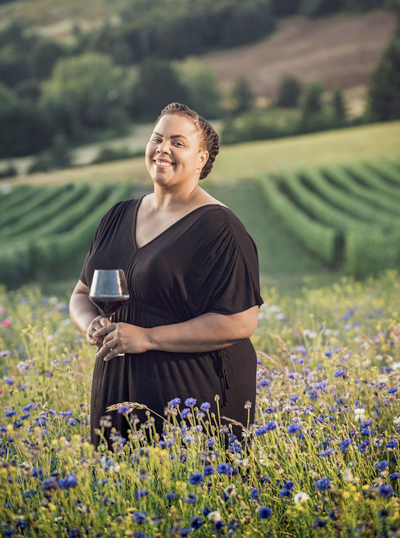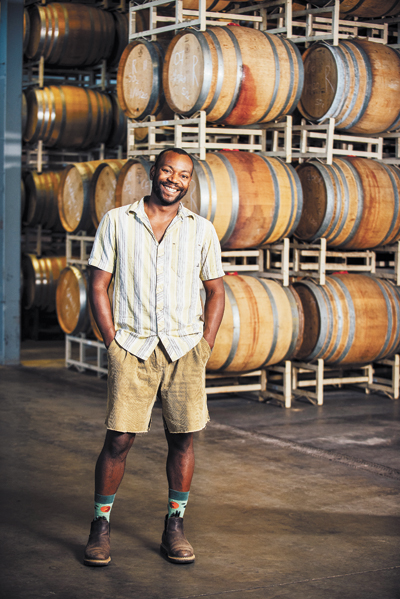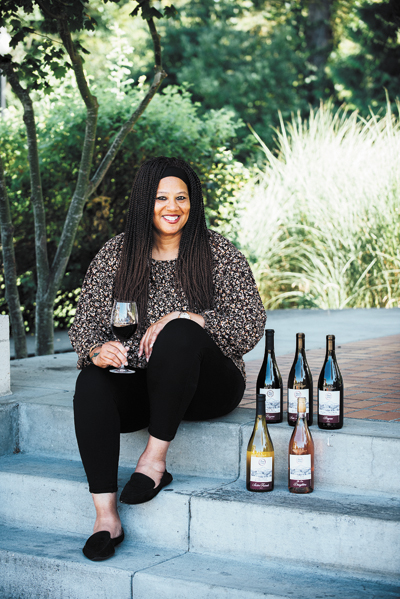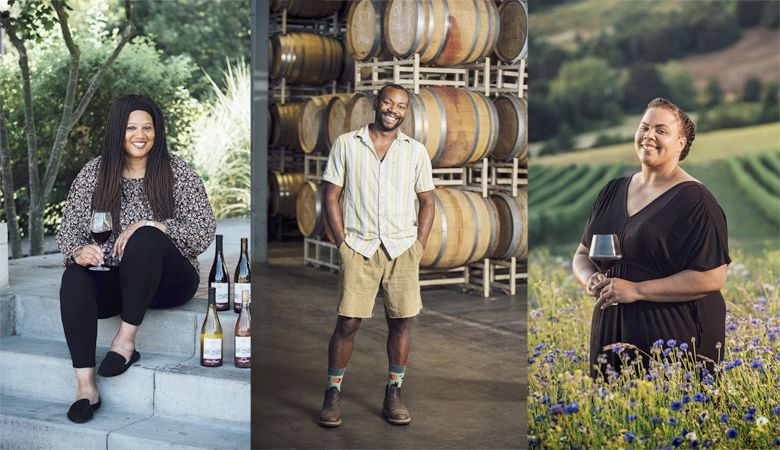Shine a Light
Illuminating Oregon’s talented Black community
The wine industry evolves gradually. There’s a good deal of waiting in every facet, from planting vines to awaiting the first harvest, not to mention the many months a wine rests in barrels prior to bottling. Beauty exists in the deliberate pace; however, certain aspects of the industry, like the lack of representation, remain ugly. Wine’s metamorphosis cannot afford to stall any longer.
One major element to consider is equity, or the lack of it, in Oregon wine. The scene, predominately white and majority male, has been catering to that crowd since the beginning. The merits of diversity and inclusion are too numerous for this story, deserving their own shelves and aisles in bookstores and libraries. The local wine community is changing for the better, but there’s so much more to do to disentangle the systemic racism that has prevented BIPOC from participating in large numbers.
Every single component of the wine industry warrants reexamination in the name of authenticity and accessibility; that includes education, marketing, sales, farming, tourism, distribution, linguistics and more. Wine journalism remains a major component, as it embodies the lens through which so many of us view the industry. This white male writer and this publication are guilty of falling into the same tired rut, now and again, writing of and to a singular demographic. We know we need to improve, and, as important as present-day awareness is, it must be acknowledged as way overdue.
Chevonne Ball, one of three prominent Black members of the Oregon wine community featured below, articulates the sentiment best: “We don’t want a handout, we want a hand up.”
Chevonne Ball
Raised across the Columbia River in Vancouver, Chevonne Ball grew up in the company of a family-size garden and fresh game. She jokes now how the food she ate as a child — the duck, pheasant, salmon and more her grandfather hunted and fished — is actually pretty fancy.
Ball first worked as a hostess at Denny’s at age 15 and since then has been attached to hospitality — and wine. After moving to Portland in 1999, she juggled multiple jobs for years, arriving at esteemed restaurant Le Pigeon in 2006. But even then, as Ball admits, she was still learning the nuances of wine — the subtle differences between a Pinot Gris and Chardonnay. That would soon change, dramatically. Her years at Le Pigeon fine-tuned her appreciation of wine and she credits restaurant co-owner and wine director Andrew Fortgang for much of her education.

After a year in France, Ball returned to the Rose City to help open Little Bird, the late, great bistro offshoot of Le Pigeon. Still, she couldn’t shake the European experience. This new-found affection persuaded her to return often, as well as expand her wine knowledge. While at home, Ball managed eateries and carried out wine buying roles. By 2017, she was ready to launch her own business, a wine tourism company.
“I started Dirty Radish for two reasons,” Ball said. “To spend more time in France and work for myself, and also offer a better overall experience. I wanted people to experience what I had.”
Ball reveled in the intimate wine encounters she experienced in Beaujolais and Lyon; not just the incredible wines — like sparkling from the former — but the people responsible for the wines, from those tending vines to cellar hands. Furthermore, wine’s ability to unite people had her hooked. Simply put, the French relationship to wine inspires Ball and her work.
Along the way, she’s mastered the subtle artistry of moderation: “You don’t have to drink it to enjoy it; you taste it,” a mantra Ball brings to her clientele. She recalls a particular tour in which her group was put to work in the vineyard in France before tasting. The connection to the process inspired even those who weren’t “wine drinkers” to sample and savor that day.
“I love telling the story of how the wine got into the bottle,” she added. “It’s all about connection to a place.” It’s a vital aspect to most industries but wine especially. It’s also something Ball has a keen grasp on, given her vast experience on restaurant floors, engineering wine lists and educating groups. “When people come along with Dirty Radish, they’re not just going on a tour with a guide. They’re exploring with their friend, Chevonne,” she explained.
Her many years in wine has given Ball a genuine respect for winegrowing, especially Biodynamics. “With that much land involved in making wine, we should be taking care of the earth and giving back to it,” she said.
Always on the move and in pursuit of compelling work, Ball is set to make her first batch of wine — Gamay Noir — this fall. Next spring, she’s off to Norway to help establish a wine program at a boutique hotel. Just this August, Ball was named on Wine Enthusiast’s lauded 40 Under 40 list. Beyond that, she has designs on travel books and overseeing her own vineyard — “and have Gamay growing everywhere.”
Jarod Sleet
Jarod Sleet started his career in food, as well. He arrived in the Northwest in 2002, from his native Kentucky, inspired by the food culture and natural beauty. Culinary school complemented his curious palate and love for cooking. As he settled into the Willamette Valley, Sleet worked in kitchens and began catering gigs. “During this time, I started trying more and more wines, and really figured out how much I enjoy wine,” Sleet recalled.

While working at New Seasons in 2008, he crossed paths with Cana’s Feast vintner Patrick Taylor; before long, Sleet was interviewing for a harvest job. The winery hired Sleet, and he rolled up his sleeves for the 2008 vintage, a remarkable one that yielded some exemplary Oregon wines. “I fell in love with the process, industry and people,” Sleet said.
The long, laborious days of crush tend to either create a lifelong bond between subject and wine or intimidate people from the industry entirely. For Sleet, it was very much the former, and soon, he was wrapping up his viticulture and enology studies at Oregon State University. He began to immerse himself in the wine community and establish vital connections with its many members.
Sleet would eventually assume roles at several esteemed Willamette Valley labels. As an intern at Archery Summit in the Dundee Hills, he worked a summer in the vineyard before transitioning into the cellar as a lab technician during crush. He spent long days with fellow harvest workers, creating friendships and diving into some delicious bottles.
Eventually, Sleet moved on to Argyle as a cellar hand. He learned the importance of time management, especially during the busiest days of harvest. Sleet reveled in the energy abuzz during early fall in the Willamette Valley. He also absorbed the deft touch and discipline required to make quality sparkling wine, a particular specialty of the Argyle brand.
In 2017, ROCO invited Sleet to be the assistant winemaker. In accepting the post, Sleet agreed to work daily alongside one of the most tenured winemakers in Oregon, Rollin Soles. The two became friends earlier when Sleet was at Argyle, but the partnership was now elevated to another level entirely. Together, they continue to craft outstanding bubbly, along with Pinot Noir and Chardonnay.
That same year, Sleet was featured in the wine-centric documentary “Red, White & Black.” The film shines a spotlight on the work of marginalized members of the Oregon wine community, including Remy Drabkin, the late Jesús Guillen Jr., and Bertony Faustin, Oregon’s first Black vintner.
Sleet believes the local wine scene is broadening for the better, albeit slowly. “The more I navigate this industry, the more I feel like I have a seat at the table, and my colleagues and peers respect that I have a different perspective, which could really add to the conversation,” he explained. “This is important because as the industry becomes more diverse and inclusive, we will need to open ears and open minds to continue this growth within the industry.”
Sommelier culture is helping the cause in bringing some youth and diversity to wine consumers all over the nation. Sleet says he’s encountering more and more groups online geared toward more diverse groups of wine pros and industry types. “These groups are really great at exposing people to new wines, and I think increasing wine’s accessibility, while decreasing its intimidation factor,” Sleet added.
Looking forward, Sleet feels optimistic about the American wine realm, especially given the expanding educational opportunities available. “I am very excited about the new technologies, equipment and techniques that are coming from New World winemaking,” Sleet said. “Especially here in the Willamette Valley, where we have great wine programs from places like Oregon State, Linfield and Chemeketa, filling the industry with new and ambitious young talent.”
Donna Stoney
Trailblazer is a fitting word to describe Donna Stoney. Prior to becoming the state’s first Black female winemaker, she was Oregon’s first Black female case manager, based in Multnomah County.
After years in the challenging and often thankless social work realm, Stoney started her own label, Stoney Wines, in the fall of 2019. She makes her wine under the tutelage of veteran winemaker Andreas Wetzel of Chateau Bianca in the mid-Willamette Valley city of Dallas. While the goal is to one day focus entirely on wine, Stoney continues working with the disabled community through Stoneybrooke Residential Services in East Portland.

“Now that I have my own wine label, my next objective is to have my own production facility,” Stoney said. “I want to create a space where wine can be made together and education can be shared, with the freedom and flexibility to create a supportive community. I want people to feel empowered to pursue their love for wine and build family along the way.”
Her love affair with wine began in the ’90s, when the Oregon scene was still very much under the radar. Upon hearing about Bertony Faustin several years back, Stoney was inspired to dig deeper. She enrolled in WSET studies and learned under Faustin’s wing at Abbey Creek. Hitting the wine books sparked an infatuation with Piedmont and Nebbiolo, a wine Stoney finds relatable to Pinot Noir in terms of flavor and context.
She admits avoiding some early roadblocks by being able to get her foot in the wine industry door. “I am blessed that it’s been slightly easier to enter the scene because there have been other winemakers paving the way,” Stoney explained. She continues to wade through the entire spectrum of the wine world and admits that things like inclusion and equity were, and still are, issues. “My ultimate goal is to make this process simpler for future generations,” Stoney added.
In the meantime, the environment could be much more welcoming. Stoney champions three major avenues to help advance the industry: scholarship access, mentorships and support. “It will take leaders and educators alike in the industry to have candid conversations [about] the lack of diversity, what barriers individuals face and institutional solutions,” Stoney said.
Stoney Wines currently produces Pinot Noir, Pinot Gris, rosé and Chardonnay. She has a special relationship with the latter, as it was the first wine she produced herself. Chardonnay remains her go-to wine, and she takes pride in finding a balance between fruit and acid. “I’m still in the learning process of winemaking,” Stoney admitted, something even winemakers with 10 times the vintages confess. “But one thing you must know about me: I continue to study and learn until it becomes second nature.”
“Now, more than ever, I think it’s essential to shed light on stories of diverse creators,” Stoney said. “I am humbled to be a woman of color entering the wine industry in the next chapter of my life. I want to encourage others that you can pursue any dream, no matter the obstacle.”











